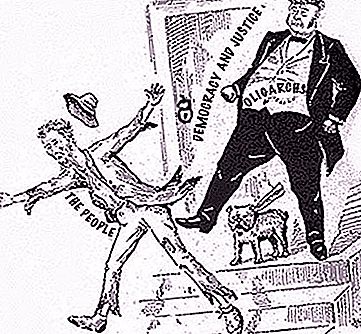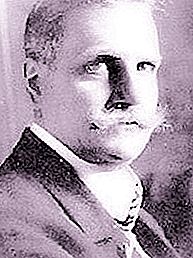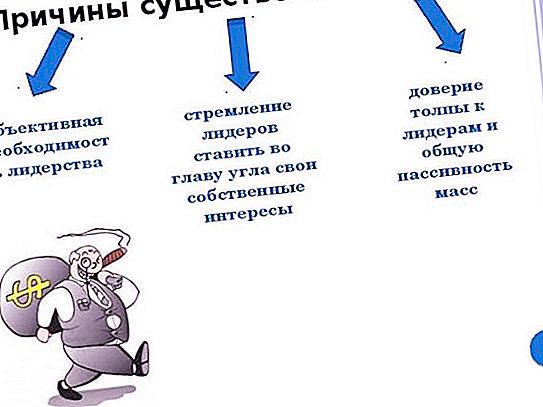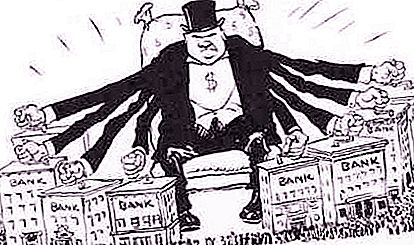The bureaucracy eventually degenerates into an oligarchy. The latter is a political regime in which power belongs to a certain circle of persons. They may be military, government officials or wealthy.

The concept of this law
The iron law of the oligarchy was formulated by the German social democrat R. Michels, who discovered that in the leadership of any party built supposedly on the aspirations of the people, a bunch of compromisers end up at the helm, trying to cling to power in various ways, making various compromises with the regime. He concluded that no matter what kind of political system is present in the country, over time it degenerates into an oligarchy, in which there is mutual responsibility and not allowing anyone outside to power. This is the idea of the iron law of the oligarchy.
The views of the founder of the law
They changed from 1900 to 1915. At this time, his views moved from internationalism to nationalism, from Marxism and syndicalism to elitism. Gradually, under the influence of M. Weber, he came to the idea of the effectiveness of bureaucracy.

In his main work, Michels writes that bureaucracy is necessary for the state. It is necessary, first of all, because it allows you to maintain relations between power and the masses.
The first source of bureaucracy's prosperity in the iron law of the oligarchy is that the middle class can give a good education to its children, but cannot provide a prosperous future, which opens the way for them to a bureaucratic system that provides the necessary wealth.
The second source is related to the fact that the state has a need to increase its supporters, who will support its existence in the form in which it exists. To protect the top authorities, she needs volunteers who will be unquestioning to the will of the elite. But the demand for a bureaucratic system is higher than the supply of advocates. This leads to the fact that the elite can choose the best, but at the same time, the number of dissatisfied people is growing. In order to get defenders from critics, the state is forced to periodically rotate the apparatus, which however does not solve the issue, but only leads to the growth of the latter.
The following conclusions can be drawn from his works: the bureaucracy, from the point of view of the elite, is politically functional, the state and party bureaucracy are based on the same principles, are called upon to achieve comparable goals, which leads to the merging of the party and state apparatus.
Influence
The iron law of the oligarchy played an important role in discrediting democracy in the last century. Thanks to him, this system began to be seen as a fiction and a screen covering the corresponding oligarchic system. As a result, oligarchic expectations began to be perceived as stupidity, and the desire for democracy as something unnatural.

All movements towards this political system began to be interpreted as such in relation to the oligarchic elites. At the same time, people's interests were completely ignored.
Media advocating conservative values began to preach that despotism is popular and democratic interests are directed against the people.
The role of the iron law of Michels oligarchy was quite significant. Ultimately, he himself became a fascist, supported Mussolini. In the latter form, he saw a non-alternative way to exercise power.

Reasons for Elitism
The author explained the existence of the iron law of the oligarchy by the corresponding concept, in which he indicated the reasons for the legitimacy of elitism:
- political stratification - democracy is impossible, based on the essence of man, the struggle in the field of politics and organizations;
- in Western states its principles cannot be realized due to the presence of oligarchic tendencies in their political organizations;
- this leads to oligarchy, which is explained by the psychology of the masses and organizations and the structure of the latter;
- under the conditions of the political regime under consideration, the privileged class has such behavior that is caused by the influence of the "masses" on the political process, while under the latter he understood the complex of psychological properties of the average person who has a need for leadership, incompetent and politically indifferent, who has a feeling of gratitude to the leaders, which led to the fact that they cannot self-organize and carry out management processes;
- the most effective are those political forces that inspire the "masses" that their goals must be supported, this contributes to the emergence of a hierarchy of power;
- leadership of the organization requires an appropriate apparatus, as a result of which the latter becomes stable, and the "masses" are reborn, changing places with leaders;
- thus, parties are divided into a leading minority and a guided majority. The leadership is moving away from the rank-and-file party members, an internal caste of a certain degree of closeness is forming, they plan to concentrate power in their hands. There is no sovereignty of the "masses" as such.
What is the helpers apparatus for?
According to the logic of the iron law of the oligarchy, such a bloated apparatus is needed when:
- the leader has insufficiently developed intellectual abilities, which his assistants are called upon to compensate;
- in the case of the selection of assistants with poor capabilities;
- with improper organization of work;
- when delegating authority to the device with self-removal from decision-making;
- with a bureaucratic management style;
- when you turn on friends;
- when the assistants speak against the will of the leader.





